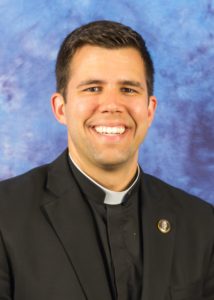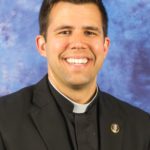
Deacon Nick Adam
Seminarian Reflection
By Deacon Nick Adam
As we come to the end of the holy season of Advent, we remember that our third pastoral priority is to “Proclaim Jesus Christ and our Catholic Faith.” This is a vital priority in a place and time where proclaiming faith of any kind can be a source of controversy. Being a Catholic in Mississippi has always meant that we will run into misunderstandings with members of other Christian denominations, but increasingly we experience the rejection of God all together by wider society.
Many Americans would rather we keep our opinions to ourselves and allow each individual to draw their own conclusions about who God is and how God interacts with the world. These realities certainly demand a courageous willingness to share the Good News as much as possible. In order to witness to the faith most effectively, however, I contend that an even more fundamental issue needs to be addressed first.
The way we interact with one another within our own church must come to the forefront. Over the past several months I have been preparing a thesis project as my seminary formation draws to a close. My thesis focuses on the unity of the Catholic Church. We profess a common creed every Sunday, and yet often we struggle to find common ground. We can quibble about issues ranging from liturgy to Church personnel. We can place labels on one another like conservative, traditional, liberal and progressive. My thesis basically states that these labels are not helpful in unifying us as Church. These labels make the Church out to be just another social club that can be broken up into different groups who share common values. This is not what the Church is. The Church is our very life; it nurtures us, teaches us, sanctifies us and saves us.
In my five and half years of seminary formation, I have seen my own opinions on these externals move and shift. I have been inspired by the example of men and women whose expression of faith is different than mine. I have also had to allow my own expectations and opinions to be challenged and sometimes reformed when faced with the truth of the Gospel and the teachings of the Church. This is the essence of living in the Church. The Church should not be a place where our own preconceived notions are always affirmed. The Lord wants us to become better people, not stay in the same old place doing the same old things the same old way.
I am certainly not a finished product in this regard. The bottom line is that we like what we like. We are comfortable with the familiar, and when we run up against something that is different, we sometimes can feel tempted to push it away. But this is not what the Church is. Our Church is guided and unified by the Holy Spirit, not by one opinion or one perspective. As we seek to implement the pastoral plan and Proclaim Jesus Christ and our Catholic faith, we have to start in our own parishes. Our message will not be as credible to non-Catholics if they hear us speaking about parishioners and priests who share our creed as if they were in rival camps!
During Advent we prepare our parishes, our homes, our families, and our hearts for the coming of Jesus on the great feast of Christmas. You can start to unify yourself with your parish during this time of preparation, and you can do this in many ways. There will be Advent penance services offered throughout the diocese so we can receive the gift of reconciliation as a community. Sin is not just a personal failing, it has an effect on the whole body of believers. When we confess our sins as a community, this is a beautiful sign of the healing that is offered to us as members of the mystical Body of Christ.
Sharing in the sacrament of penance also prepares us for the fruitful reception of the gift of the Eucharist, remembering that Christ did not only come in the flesh 2,000 years ago, but he seeks to be united with us each time we receive communion. Christ not only unites us to him in the Eucharist, but we are truly united as Church when we celebrate this sacrament. Remember that unity the next time you see something that bothers you in the Church. Instead of bickering with, or about, that person, pray for that person, ask the Lord to bring a spirit of unity to the Church of Jackson as we await the celebration of the birth of Jesus, who came to save all of us.
(Deacon Nick Adam is set to be ordained to the priesthood in May of 2018.)

